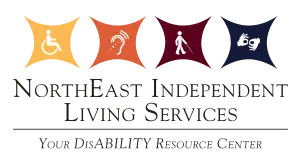
Imagine living in a world where every step, every interaction, and every basic task is met with a mountain of challenges. This is the daily reality for millions of people living with disabilities. Disability Advocacy plays a crucial role in challenging societal norms, pushing for policy changes, and ensuring that all individuals—regardless of their physical or mental capabilities—have equal rights and opportunities.
In this blog, we will discuss the importance of disability advocacy and how NorthEast Independent Living Services (NEILS) can assist you in advocating for yourself and others.
What is Disability Advocacy?
Advocacy is defined as standing up for one’s rights or the rights of others. Disability Advocacy means becoming an advocate to ensure that the needs and rights of people with disabilities are met. It refers to the process of promoting and ensuring equal access to services, employment, education, housing, and transportation for people with disabilities. NEILS is committed to empowering people with disabilities to become confident self-advocates and support others in their community to do the same.
The Importance of Disability Advocacy
Disability Advocacy promotes significant change within our society and offers the following opportunities:
1. Amplifies your voice
People with disabilities face unique challenges. Many people often have to navigate complex systems to access services, resources, and employment.
Self-advocacy is the key to empowering individuals with disabilities to take control of their lives. Advocacy is an effective tool that enables people with disabilities to amplify their voices and be heard by policymakers and decision-makers who can create and implement laws and policies that improve their quality of life. By becoming an advocate, you can influence the discussion on disability issues that matter to you, your friends, and your community.
2. Promotes inclusivity
Disability advocacy is also essential in creating a more inclusive society. It helps to remove the discrimination and barriers that people with disabilities face when trying to access essential services and be active members of their communities. Advocacy can help change societal attitudes and increase awareness about disability issues, leading to more access to education, employment, and community participation. People with disabilities who advocate for themselves or others can effect change that will benefit their community and society as a whole.
3. Helps you navigate complex systems
Navigating systems and processes can be confusing and overwhelming. Disability rights laws, policies, and regulations can be complicated, making it challenging to know where to start. Advocacy can help make the processes clearer and easier to navigate as it provides support and guidance to individuals with disabilities to understand and use their rights. By receiving support from an advocate, you can confidently navigate complex systems and advocate for your needs and those of your community.
4. Provides a sense of community
Disability advocacy can help create a sense of community for individuals to connect and learn from each other and share their experiences. By advocating together, people can build strong and lasting relationships, support each other, and share information that will help raise awareness and reduce the exclusion and barriers they face.
At NEILS, we offer a variety of services focused on bringing people together, including Disability Awareness Programs and Peer Support. Our vision is to be accessible for all people and for our communities to foster and promote acceptance and diversity.
5. Achieves remarkable outcomes
The power of advocacy cannot be underestimated when it comes to achieving remarkable outcomes. Self-advocates have influenced significant legislative changes, such as the Americans with Disabilities Act (ADA), Medicaid, and Social Security disability benefits. These laws have had a positive impact on the lives of millions of people with disabilities, enabling access to critical services and resources that enhance their quality of life.
Advocacy can also lead to breakthroughs in research and development, the creation of accessible technology, and the challenge of limiting public attitudes and societal stigma.
Conclusion
Advocating for yourself or others can be intimidating, but it is an important part of ensuring that the rights and needs of people with disabilities are being met. NEILS is committed to helping people with disabilities become confident self-advocates and support their communities. Disability advocacy is an effective method of enacting change, promoting inclusivity, and new laws and policies that improve the quality of life for individuals with disabilities.
Looking for additional advocacy support? NEILS can assist and/or advocate on your behalf to obtain access to benefits, services, and programs, as well as protect against discrimination and community barriers. Contact us today for more information. Remember, your voice matters!
